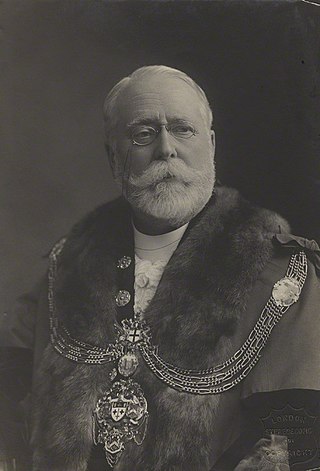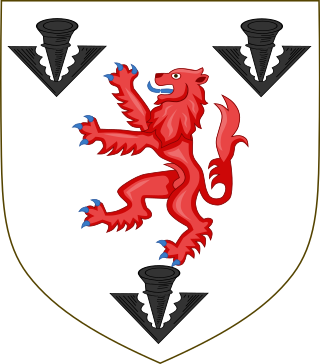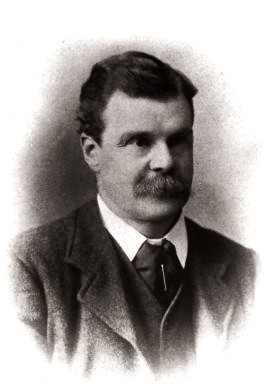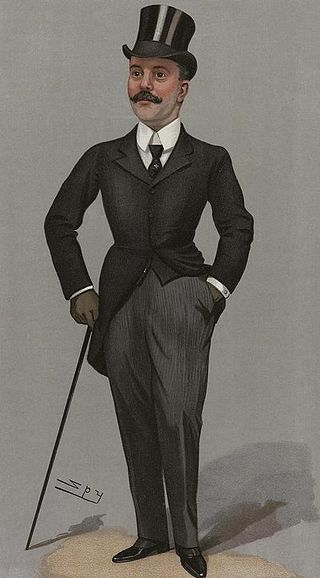Related Research Articles

Adolphus Cambridge, 1st Marquess of Cambridge, born Prince Adolphus of Teck and later the Duke of Teck, was a relative of the British royal family, a great-grandson of George III and younger brother of Queen Mary, the wife of George V. In 1900, he succeeded his father as Duke of Teck in the Kingdom of Württemberg. He relinquished his German titles in 1917 to become Marquess of Cambridge.

Frederick Edward Grey Ponsonby, 1st Baron Sysonby, was a British soldier and courtier.

Sir John James Baddeley, 1st Baronet, was a Lord Mayor of London.
The High Sheriff of County Galway was the Sovereign's judicial representative in County Galway. Initially an office for lifetime, assigned by the Sovereign, the High Sheriff became annually appointed from the Provisions of Oxford in 1258. Besides his judicial importance, he had ceremonial and administrative functions and executed High Court Writs.

Francis Charles Granville Egerton, 3rd Earl of Ellesmere VD, DL, JP, styled Viscount Brackley between 1857 and 1862, was a British peer, soldier and author from the Egerton family. He owned several racehorses and 13,300 acres (54 km2) land.

Tonman Mosley, 1st Baron Anslow,, was a British Conservative politician, businessman and judge. He was chairman of the Buckinghamshire County Council from 1904 until 1921 and chairman of the North Staffordshire Railway company from 1904 until 1923.

Thomas Jeeves Horder, 1st Baron Horder, was a British physician best known for his appointments as physician-in-ordinary to Kings Edward VII, George V, and George VI, and extra physician to Queen Elizabeth II. He was also the chosen physician of three prime ministers. He was knighted in 1918, made a baronet in 1923 and raised to the peerage in 1933.
The Sheriff of County Dublin was the Sovereign's judicial representative in County Dublin. Initially, an office for a lifetime, assigned by the Sovereign, the Sheriff became an annual appointment following the Provisions of Oxford in 1258. The first recorded Sheriff was Ralph Eure, appointed in that year. The next recorded Sheriff was Sir David de Offington, who was Sheriff in 1282. Besides his judicial importance, the sheriff had ceremonial and administrative functions and executed High Court Writs.

Lieutenant-General Sir Herbert Edward Watts was a British Army officer who commanded 7th Division and later XIX Corps during the First World War.

Sir Sidney Robert Greville was a British civil servant and courtier who held several appointments in the Royal Households of the United Kingdom.

Major-General Sir Henry Peter Ewart, 1st Baronet, was a British Army officer and courtier.
Sir Edward Rae Davson, 1st Baronet, was a British businessman who was influential in colonial economics. He was the managing director of Messrs. S. Davson & Co., Ltd., a prominent West Indies merchant firm.
References
- ↑ "Knight Bachelor", Encyclopedia Britannica . Retrieved 5 April 2020.
- 1 2 3 The London Gazette, 21 January 1910 (issue 28331), p. 526.
- 1 2 3 The London Gazette, 24 June 1910 (issue 28389), p. 4485.
- ↑ The London Gazette , 1 March 1910 (issue 28344), p. 1498.
- ↑ The London Gazette, 18 March 1910 (issue 28349), p. 1953.
- ↑ The Edinburgh Gazette , 14 June 1910 (issue 12258), p. 623.
- 1 2 3 4 5 6 7 8 9 10 11 12 13 14 15 16 17 18 19 20 21 22 23 24 25 26 27 28 29 30 31 32 33 34 35 36 37 38 39 40 41 The London Gazette, 16 August 1910 (issue 28407), pp. 5945–5946.
- ↑ Walford's County Families of the United Kingdom (1921), p. 579.
- ↑ Walford's County Families of the United Kingdom (1921), p. 709.
- ↑ Walford's County Families of the United Kingdom (1921), p. 729.
- ↑ Chris Cook, Sources in British Political History 1900–1951, vol. 4 (Macmillan, 1977), p. 98.
- ↑ The London Gazette, 24 February 1911 (issue 28469), p. 1462.
- 1 2 3 4 The London Gazette, 14 October 1910 (issue 28424), p. 7247.
- ↑ The Edinburgh Gazette, 1 November 1910 (issue 12298), p. 1127.
- 1 2 The London Gazette, 16 December 1910 (issue 28447), p. 9392.